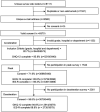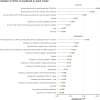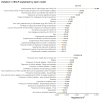Psychological distress and trauma in doctors providing frontline care during the COVID-19 pandemic in the United Kingdom and Ireland: a prospective longitudinal survey cohort study
- PMID: 34244282
- PMCID: PMC8275363
- DOI: 10.1136/bmjopen-2021-049680
Psychological distress and trauma in doctors providing frontline care during the COVID-19 pandemic in the United Kingdom and Ireland: a prospective longitudinal survey cohort study
Abstract
Objectives: The psychological impact of the COVID-19 pandemic on doctors is a significant concern. Due to the emergence of multiple pandemic waves, longitudinal data on the impact of COVID-19 are vital to ensure an adequate psychological care response. The primary aim was to assess the prevalence and degree of psychological distress and trauma in frontline doctors during the acceleration, peak and deceleration of the COVID-19 first wave. Personal and professional factors associated with psychological distress are also reported.
Design: A prospective online three-part longitudinal survey.
Setting: Acute hospitals in the UK and Ireland.
Participants: Frontline doctors working in emergency medicine, anaesthetics and intensive care medicine during the first wave of the COVID-19 pandemic in March 2020.
Primary outcome measures: Psychological distress and trauma measured using the General Health Questionnaire-12 and the Impact of Events-Revised.
Results: The initial acceleration survey distributed across networks generated a sample of 5440 doctors. Peak and deceleration response rates from the original sample were 71.6% (n=3896) and 56.6% (n=3079), respectively. Prevalence of psychological distress was 44.7% (n=1334) during the acceleration, 36.9% (n=1098) at peak and 31.5% (n=918) at the deceleration phase. The prevalence of trauma was 23.7% (n=647) at peak and 17.7% (n=484) at deceleration. The prevalence of probable post-traumatic stress disorder was 12.6% (n=343) at peak and 10.1% (n=276) at deceleration. Worry of family infection due to clinical work was the factor most strongly associated with both distress (R2=0.06) and trauma (R2=0.10).
Conclusion: Findings reflect a pattern of elevated distress at acceleration and peak, with some natural recovery. It is essential that policymakers seek to prevent future adverse effects through (a) provision of vital equipment to mitigate physical and psychological harm, (b) increased awareness and recognition of signs of psychological distress and (c) the development of clear pathways to effective psychological care.
Trial registration number: ISRCTN10666798.
Keywords: Accident & emergency medicine; COVID-19; adult anaesthesia; adult intensive & critical care; mental health.
© Author(s) (or their employer(s)) 2021. Re-use permitted under CC BY-NC. No commercial re-use. See rights and permissions. Published by BMJ.
Conflict of interest statement
Competing interests: Many of the authors have been working as frontline clinicians during the COVID-19 pandemic. They have no competing interests to declare.
Figures







References
Publication types
MeSH terms
Associated data
LinkOut - more resources
Full Text Sources
Medical
